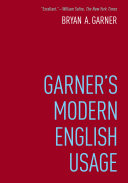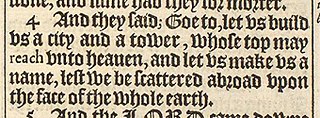Related Research Articles
Singular they, along with its inflected or derivative forms, them, their, theirs, and themselves, is a gender-neutral third-person pronoun. It typically occurs with an indeterminate antecedent, in sentences such as:
A split infinitive is a grammatical construction in which an adverb or adverbial phrase separates the "to" and "infinitive" constituents of what was traditionally called the "full infinitive", but is more commonly known in modern linguistics as the to-infinitive. In the history of English language aesthetics, the split infinitive was often deprecated, despite its prevalence in colloquial speech. The opening sequence of the Star Trek television series contains a well-known example, "to boldly go where no man has gone before", wherein the adverb boldly was said to split the full infinitive, to go. Multiple words may split a to-infinitive, such as: "The population is expected to more than double in the next ten years."

A Dictionary of Modern English Usage (1926), by Henry Watson Fowler (1858–1933), is a style guide to British English usage, pronunciation, and writing. Covering topics such as plurals and literary technique, distinctions among like words, and the use of foreign terms, the dictionary became the standard for other style guides to writing in English. Hence, the 1926 first edition remains in print, along with the 1965 second edition, edited by Ernest Gowers, which was reprinted in 1983 and 1987. The 1996 third edition was re-titled as The New Fowler's Modern English Usage, and revised in 2004, was mostly rewritten by Robert W. Burchfield, as a usage dictionary that incorporated corpus linguistics data; and the 2015 fourth edition, revised and re-titled Fowler's Dictionary of Modern English Usage, was edited by Jeremy Butterfield, as a usage dictionary. Informally, readers refer to the style guide and dictionary as Fowler's Modern English Usage, Fowler, and Fowler's.
In grammar, a conjunction is a part of speech that connects words, phrases, or clauses that are called the conjuncts of the conjunctions. That definition may overlap with that of other parts of speech, and so what constitutes a "conjunction" must be defined for each language. In English, a given word may have several senses, and be either a preposition or a conjunction depending on the syntax of the sentence. For example, after is a preposition in "he left after the fight" but is a conjunction in "he left after they fought". In general, a conjunction is an invariable (non-inflected) grammatical particle that may or may not stand between the items conjoined.
Elegant variation is the use of synonyms to avoid repetition or add variety. The term was introduced in 1906 by H. W. Fowler and F. G. Fowler in The King's English. In their meaning of the term, they focus particularly on instances when the word being avoided is a noun or its pronoun. Pronouns are themselves variations intended to avoid awkward repetition, and variations are so often necessary, that they should be used only when needed. The Fowlers recommend that "variations should take place only when there is some awkwardness, such as ambiguity or noticeable monotony, in the word avoided".

The phrase pathetic fallacy is a literary term for the attribution of human emotion and conduct to things found in nature that are not human. It is a kind of personification that occurs in poetic descriptions, when, for example, clouds seem sullen, when leaves dance, or when rocks seem indifferent. The English cultural critic John Ruskin coined the term in the third volume of his work Modern Painters (1856).
Henry Watson Fowler was an English schoolmaster, lexicographer and commentator on the usage of the English language. He is notable for both A Dictionary of Modern English Usage and his work on the Concise Oxford Dictionary, and was described by The Times as "a lexicographical genius".
The usage of a language is the ways in which its written and spoken variations are routinely employed by its speakers; that is, it refers to "the collective habits of a language's native speakers", as opposed to idealized models of how a language works in the abstract. For instance, Fowler characterized usage as "the way in which a word or phrase is normally and correctly used" and as the "points of grammar, syntax, style, and the choice of words." In everyday usage, language is used differently, depending on the situation and individual. Individual language users can shape language structures and language usage based on their community.

In the English language, there are grammatical constructions that many native speakers use unquestioningly yet certain writers call incorrect. Differences of usage or opinion may stem from differences between formal and informal speech and other matters of register, differences among dialects, and so forth. Disputes may arise when style guides disagree with each other, or when a guideline or judgement is confronted by large amounts of conflicting evidence or has its rationale challenged.
Robert William Burchfield CNZM, CBE was a lexicographer, scholar, and writer, who edited the Oxford English Dictionary for thirty years to 1986, and was chief editor from 1971.

Sir Ernest Arthur Gowers was a British civil servant and author who is best remembered for his book Plain Words, first published in 1948, and his revision of Fowler's classic Modern English Usage. Before making his name as an author, he had a long career in the Civil Service, which he entered in 1903. His final full-time appointment was as Senior Regional Commissioner for Civil Defence, London Region (1940–45). After the Second World War, he was appointed chairman of numerous government inquiries, including the 1949 Royal Commission into Capital Punishment. He was also chairman of the Harlow New Town Development Corporation.
A rondel is a verse form originating in French lyrical poetry of the 14th century. Specifically, the rondel refers to "a form with two rhymes, three stanzas, and a two-line refrain that repeats either two and a half or three times: ABba abAB abbaA(B)."

Fewer versus less is a debate in English grammar about the appropriate use of these two determiners. Linguistic prescriptivists usually say that fewer and not less should be used with count nouns, and that less should be used only with mass nouns. This distinction was first tentatively suggested by the grammarian Robert Baker in 1770, and it was eventually presented as a rule by many grammarians since then. However, modern linguistics has shown that idiomatic past and current usage consists of the word less with both count nouns and mass nouns so that the traditional rule for the use of the word fewer stands, but not the traditional rule for the use of the word less. As Merriam-Webster's Dictionary of English Usage explains, "Less refers to quantity or amount among things that are measured and to number among things that are counted.”
Chinaman is a term referring to a Chinese man or person, a Mainland Chinese national or, in some cases, a person native to geographical East Asia or of perceived East Asian race. While the term has no negative connotations in older dictionaries and the usage of such compound terms as Englishman, Scotsman, Frenchman, Dutchman, Irishman, and Welshman are sometimes cited as unobjectionable parallels, the term is noted as having pejorative overtones by modern dictionaries. Its derogatory connotations evolved from its use in pejorative contexts regarding Chinese people and other Asians as well as its grammatical incorrectness which resembles stereotypical characterizations of Chinese accents in English-speaking associated with discrimination. The usage of the term Chinaman is strongly discouraged by Asian American organizations.

Garner's Modern English Usage (GMEU), written by Bryan A. Garner and published by Oxford University Press, is a usage dictionary and style guide for contemporary Modern English. It was first published in 1998 as A Dictionary of Modern American Usage, with a focus on American English, which it retained for the next two editions as Garner's Modern American Usage (GMAU). It was expanded to cover English more broadly in the 2016 fourth edition, under the present title. The work covers issues of usage, pronunciation, and style, from distinctions among commonly confused words and phrases to notes on how to prevent verbosity and obscurity. In addition, it contains essays about the English language. An abridged version of the first edition was also published as The Oxford Dictionary of American Usage and Style in 2000 and a similar version was published in The Chicago Manual of Style 16th edition in 2017. The latter includes three sections titled "Grammar", "Syntax" and "Word Usage", each with several subcategories.
A false, coined, fake, bogus or pseudo-title, also called a Time-style adjective and an anarthrous nominal premodifier, is a kind of appositive phrase before a noun predominantly found in journalistic writing. It formally resembles a title, in that it does not start with an article, but is a common noun phrase, not a title. An example is the phrase convicted bomber in "convicted bomber Timothy McVeigh", rather than "the convicted bomber Timothy McVeigh".

This list comprises widespread modern beliefs about English language usage that are documented by a reliable source to be misconceptions.
The word data is most often used as a singular mass noun in educated everyday usage. However, due to the history and etymology of the word, considerable controversy has existed on whether it should be considered a mass noun used with verbs conjugated in the singular, or should be treated as the plural of the now-rarely-used datum.

The inanimate whose refers to the use in English of the relative pronoun whose with non-personal antecedents, as in: "That's the car whose alarm keeps waking us up at night." The construction is also known as the whose inanimate, non-personal whose, and neuter whose.
References
- ↑ "Wardour Street" 2007.
- ↑ Ballantyne 1888.
- ↑ Ballantyne 1888, p. 589.
- ↑ See for examples: Anonymous 1890, Sainsbury 1912 , p. 435, Ball 1931 , p. xxxv
- ↑ Fowler & Fowler 1906, p. 3.
- ↑ Fowler 1926.
- ↑ Collinson 1927 , p. 127, Wordsworth 2011
- ↑ Burchfield 2004, p. 833.
- 1 2 Butterfield 2015, p. 870.